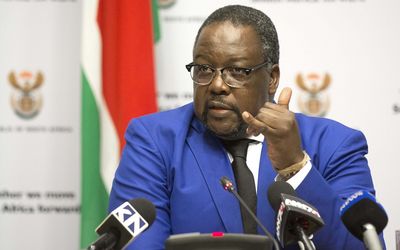FOR much of this week, an astounding confrontation has raged in public, with the South African Revenue Service (SARS), Hawks and intelligence services on the one side pitted against Finance Minister Pravin Gordhan.
Anywhere in the world, such a dispute would be perplexing. In SA, which is battling to repair its reputation as an investment destination and stave off a downgrade to junk status, it’s doubly so.
Therefore, when Police Minister Nathi Nhleko and State Security Minister David Mahlobo called a briefing to explain the Hawks investigation that has ensnared Mr Gordhan, much was expected.
Instead, little light was shed on the law that had been broken; the timing of the approach to Mr Gordhan (just before the crucial budget speech); the charges pursued; or other parameters of the probe into a so-called "rogue" unit at the tax agency.
Ahead of the briefing, Mr Gordhan, through his lawyers, queried the legal basis of the 27 questions the Hawks had sent to him days before the budget.
In a letter to Hawks head Lt-Gen Mthandazo Ntlemeza, Mr Gordhan asked on what authority he was being questioned and what offence was being investigated.
The call for more information is not an unusual one and should not be difficult to comply with, if the Hawks were conducting a professional investigation, free of the tinge of political interference.
This call is usually based on the principle of probable cause, which is a critical provision that not only helps to achieve justice for the people suspected of wrongdoing, but is also a mechanism to avoid the abuse of prosecutorial institutions.
When the same questions were put to the two ministers, not surprisingly, they failed to answer adequately.
Mr Nhleko, the political head of the Hawks, was especially poor in his attempts at an explanation.
Worse still, it reminded us of his attempt to shield President Jacob Zuma with his report on the spending on Nkandla.
Evidently, Mr Nhleko has not learnt anything from that debacle. Pushed by journalists, he was dismissive, contending that to ask such questions was "strange", as the police operate within the framework of the Constitution.
The Hawks have not acted with circumspection.
Without adequate reasons for their actions, the public is likely to entertain the possibility that they have been drawn into a dangerous political game.
It is also telling that the African National Congress has officially distanced itself from the Hawks’ actions. After all, the party was behind its creation after the Scorpions were apparently destroyed for the pursuit of Mr Zuma for corruption.
Given the charged environment and numerous suspicions, it is in the interests of justice and good governance — and those of the Hawks themselves — that an honest attempt is made to demonstrate probable cause.
Failure to do so renders the agency vulnerable to suspicions that it is driven by political motives.
Five investigations have been conducted into the contentious SARS unit, but numerous questions remain.
Surely, it’s time the recommendation of one of them — Advocate Muzi Sikhakhane — be taken to heart: set up a judicial commission of inquiry.
Public appetite for yet another commission may be thin, but in this instance, an investigation that is seen to be credible is very important.
The institutions involved — the tax agency and Treasury are too important for SA’s survival. It is not appropriate for the heads of both to be at war when the economy is bleeding.
Because so many probes have yielded so little, the sores will fester until the appropriate surgery is performed.
Nothing but an independent commission headed by a credible person is likely to remedy the situation.

Police Minister Nathi Nhleko addresses a press conference on the so-called rogue unit inquiry, in Cape Town on Wednesday. Picture: SIYABULELA DUDA
FOR much of this week, an astounding confrontation has raged in public, with the South African Revenue Service (SARS), Hawks and intelligence services on the one side pitted against Finance Minister Pravin Gordhan.
Anywhere in the world, such a dispute would be perplexing. In SA, which is battling to repair its reputation as an investment destination and stave off a downgrade to junk status, it’s doubly so.
Therefore, when Police Minister Nathi Nhleko and State Security Minister David Mahlobo called a briefing to explain the Hawks investigation that has ensnared Mr Gordhan, much was expected.
Instead, little light was shed on the law that had been broken; the timing of the approach to Mr Gordhan (just before the crucial budget speech); the charges pursued; or other parameters of the probe into a so-called "rogue" unit at the tax agency.
Ahead of the briefing, Mr Gordhan, through his lawyers, queried the legal basis of the 27 questions the Hawks had sent to him days before the budget.
In a letter to Hawks head Lt-Gen Mthandazo Ntlemeza, Mr Gordhan asked on what authority he was being questioned and what offence was being investigated.
The call for more information is not an unusual one and should not be difficult to comply with, if the Hawks were conducting a professional investigation, free of the tinge of political interference.
This call is usually based on the principle of probable cause, which is a critical provision that not only helps to achieve justice for the people suspected of wrongdoing, but is also a mechanism to avoid the abuse of prosecutorial institutions.
When the same questions were put to the two ministers, not surprisingly, they failed to answer adequately.
Mr Nhleko, the political head of the Hawks, was especially poor in his attempts at an explanation.
Worse still, it reminded us of his attempt to shield President Jacob Zuma with his report on the spending on Nkandla.
Evidently, Mr Nhleko has not learnt anything from that debacle. Pushed by journalists, he was dismissive, contending that to ask such questions was "strange", as the police operate within the framework of the Constitution.
The Hawks have not acted with circumspection.
Without adequate reasons for their actions, the public is likely to entertain the possibility that they have been drawn into a dangerous political game.
It is also telling that the African National Congress has officially distanced itself from the Hawks’ actions. After all, the party was behind its creation after the Scorpions were apparently destroyed for the pursuit of Mr Zuma for corruption.
Given the charged environment and numerous suspicions, it is in the interests of justice and good governance — and those of the Hawks themselves — that an honest attempt is made to demonstrate probable cause.
Failure to do so renders the agency vulnerable to suspicions that it is driven by political motives.
Five investigations have been conducted into the contentious SARS unit, but numerous questions remain.
Surely, it’s time the recommendation of one of them — Advocate Muzi Sikhakhane — be taken to heart: set up a judicial commission of inquiry.
Public appetite for yet another commission may be thin, but in this instance, an investigation that is seen to be credible is very important.
The institutions involved — the tax agency and Treasury are too important for SA’s survival. It is not appropriate for the heads of both to be at war when the economy is bleeding.
Because so many probes have yielded so little, the sores will fester until the appropriate surgery is performed.
Nothing but an independent commission headed by a credible person is likely to remedy the situation.





















Change: 0.83%
Change: 0.93%
Change: 0.95%
Change: 0.73%
Change: 1.91%
Data supplied by Profile Data
Change: 0.58%
Change: 0.39%
Change: 0.83%
Change: 0.00%
Change: 0.38%
Data supplied by Profile Data
Change: -1.42%
Change: -0.79%
Change: -0.45%
Change: -0.86%
Change: -0.35%
Data supplied by Profile Data
Change: 2.15%
Change: 2.20%
Change: 2.03%
Change: 2.47%
Change: 2.88%
Data supplied by Profile Data